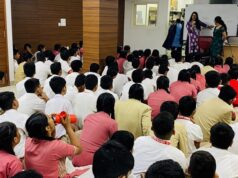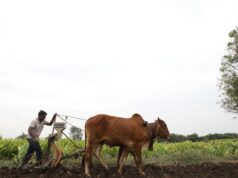This article appeared in a publication of ‘Forum of Free Enterprise.’ Originally written in 1969, it was authored by A G Mulgaokar—an advocate and authority on constitutional law. At the time, the Right to Property was a Fundamental Right in the constitution; but was constantly being undermined by successive amendments. In our present discourse on Land Acquisition, the matter of debate has come to revolve around the adequacy of compensation and how acquisition can be made fair—with no real debate on strengthening and affirming property rights. In this piece, Mulgaokar talked about the importance of property rights and how our politicians and legislators were undermining these. What he said then remains relevant even today.
The Indian Constitution in embodying in a separate chapter certain rights including those to personal freedom and to private property and designating this as the Chapter of Fundamental Rights recognised certain cardinal principles, some explicitly and others by implication. What is fundamental if it is not inherent and unalterable; and how much fundamental is a right if it can be restricted or taken away by just an ordinary legislative process as the fancy takes some legislators?
The issue involves not only legal or constitutional but moral as well as social and economic considerations. If all these considerations are fully and dispassionately weighed it will be seen that the move is an altogether retrograde step. The fundamental rights guaranteed to the Indian citizen in the Constitution are broadly his life and freedom, certain liberties like free speech and right to practice any profession or trade, and lastly acquire and hold property. It should be remembered that the term property covers a very wide field, but it is not necessary to go into all its details for the purposes of our discussion. What is attempted by the contemplated move is for the present to remove the right to acquire and hold property from those guaranteed to the citizen in the Constitution. How long, then, before the others are attacked? Perhaps one by one, as the whim or fancy takes the necessary number of legislators. Take the right to move to any place in the union territory given to every citizen. Is it difficult to imagine that it will be one of the next ones to be attacked? At this rate no right can be considered fundamental. If anyone can be taken away, so can all. Now the Indian Constitution in guaranteeing these various rights and freedom to the Indian citizen has not placed them in a totally rigid and inviolate form. They are subject to abridgement and even suspension provided this is reasonable and in public interest. So if the public interest necessitates it and it is reasonably done, a fundamental right can be by legislation restricted. If in spite of all this the move is to be persisted in, then who can believe in the fundamentalness of these fundamental rights? This, then, is the moral issue.
There is also another aspect to this moral issue which no sensible legislator can afford to omit from his consideration. Nature has planted in Man the instinct of self-preservation. We see evidence of it even in a child when it refuses to part with a battered toy and in an adult when he saves for his own future or for his dependants. The result of his savings is his property and he is entitled to do what he likes with it subject to what is known as social control. (Even the paper Constitution of the U.S.S.R. recognises this right.) This world-wide, not excluding communist countries, recognition is as much due to the natural instinct planted in man as also because thereby the national economy is strengthened. As the individual citizen saves he adds to national wealth. Therefore, if you take away the individual’s rights over his property, two results can be expected to follow. We have already seen what disastrous results have followed from prohibition. This is what naturally happens when an attempt is made to fly in the face of public opinion or a natural human instinct. This is exactly what will happen, there will be widespread evasions and breaches of the law. In the second place there will be, if this step even partially achieves its desired results, so much dislocation in the country’s economic structure as to prove a national calamity. Indian history tells of a Delhi King transferring his seat from Delhi to Daulatabad and forcing the whole population to follow suit. The disastrous results that followed have to be read to be believed.
Having considered the moral and economic aspects of the question, it only remains briefly to consider the legal or constitutional aspect of the matter. By a recent decision of the Supreme Court it has been held that Parliament has no power to amend the Constitution so as to take away or abridge the fundamental rights. The Court has however expressly saved from the application of this ruling all the earlier amendments to the Constitution on the doctrine of prospective overruling. It held that under Art. 368 the Parliament has the power to amend the Constitution. But under 13(2) no law which takes away or abridges fundamental rights is valid. It answers the question whether an amendment is law affirmatively. Five of the six judges who expressed the majority view hold that amendment is made in exercise of residuary power under Art. 245 and Art. 368 prescribes the procedure to be followed. One judge, however, held that the power to amend was explicitly given in Art. 368. But as we see, in any case, as the result of an amendment to a law is also a law and therefore, if it abridges a fundamental right, it must attract the application of Art., 13(2) which prohibits the making of any law which takes away a fundamental right. The only alternative therefore would be the summoning of another Constituent Assembly charged with the specific task of either amending the Constitution or writing up another.
Here, again, another very important constitutional consideration arises. It cannot be said that the last general election was fought by any party on the issue of amendment of the Constitution. It is a cardinal principle of parliamentary democracy that no bill causing major constitutional change should be allowed to be brought in the life of a parliament unless this was placed before the electorate at the election time by the party concerned. Those who know their Constitutional Law will remember that Asquith fought a general election in January 1910 (in Edward VII’s lifetime) and came to power. The issue had been the revolutionary Budget of Lloyd George which the House of Lords was blocking. When Asquith approached George V (Edward VII had died in May 1916) to promise to create enough number of peers to ensure the successful passage of the Budget through the Lords, the King, though only a few weeks on the throne, insisted that Asquith face another general election on the specific issues of Budget and amendment of the powers of the Rouse of Lords. So that, although a general election had only taken place in January 1910, the ruling Liberal Party under Asquith had to fight another general election within a few months (in October 1910) and the country had to face all the inevitable dislocation and expense. That Asquith won the election and the two measures, the Budget and the Parliament Act, were duly passed is a matter of history. My object in recounting this important event in the constitutional history of British democracy is to point out the great lesson it holds for this country but in a great sense for President Giri. It is his bounden duty to warn the Prime Minister that whatever the Supreme Court does or does not do, he will be unable to accord his assent to an Act amending the Constitution in such a major way unless the people have had a chance of declaring their wishes in the matter in a general election.
You can access the original article here. Visit indianliberals.in for more works by Indian Liberals dating back to the 19th Century.
Post Disclaimer
The opinions expressed in this essay are those of the authors. They do not purport to reflect the opinions or views of CCS.





